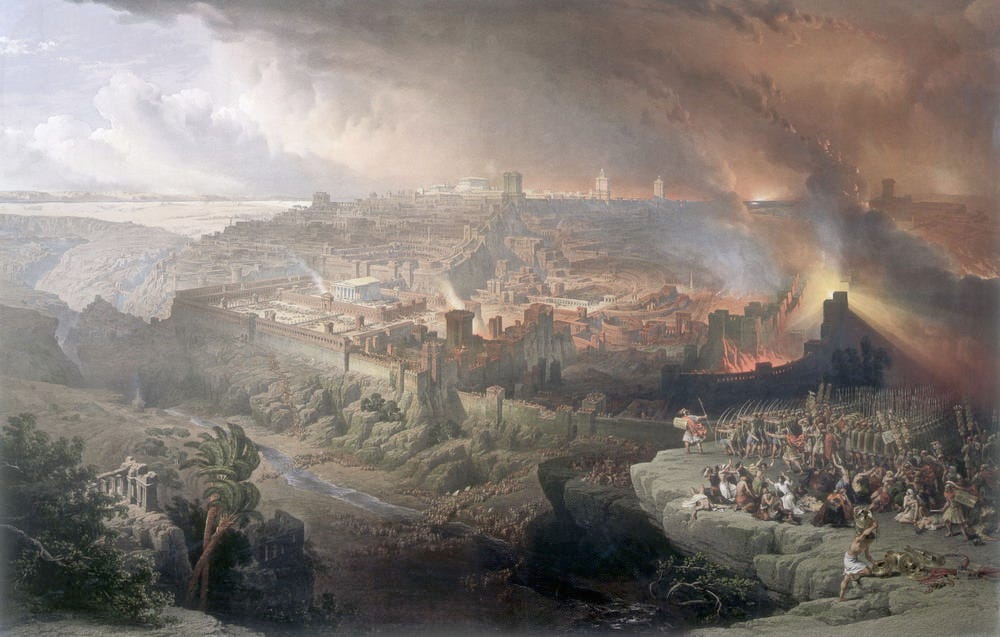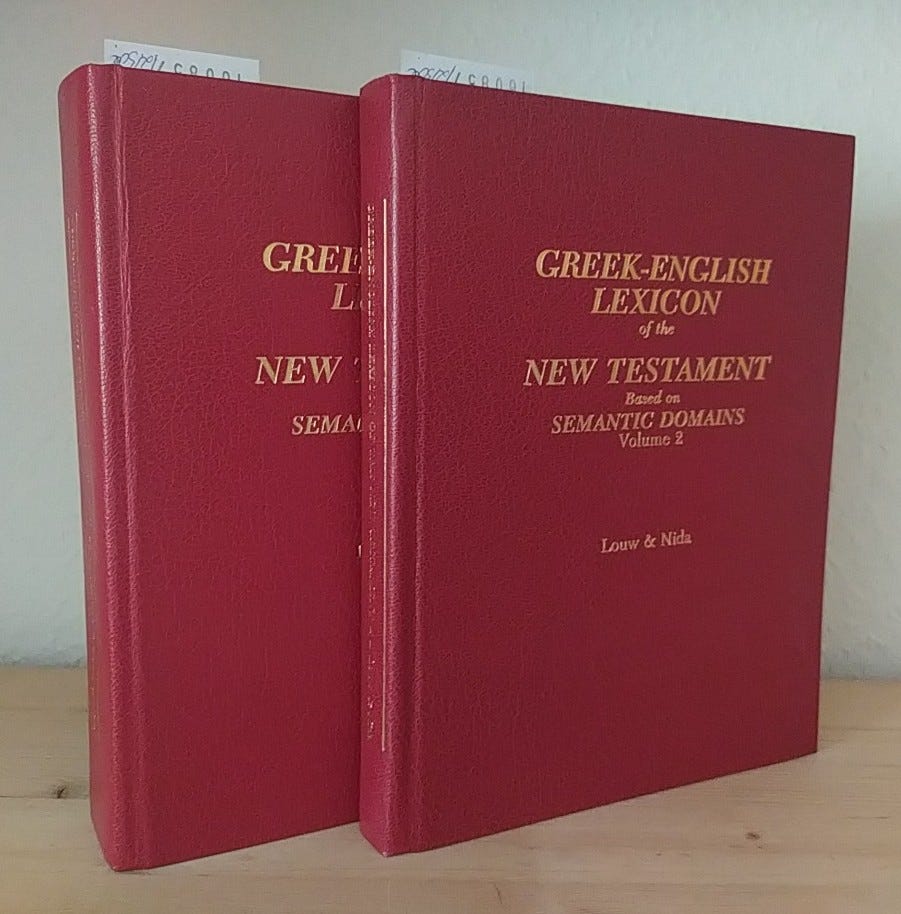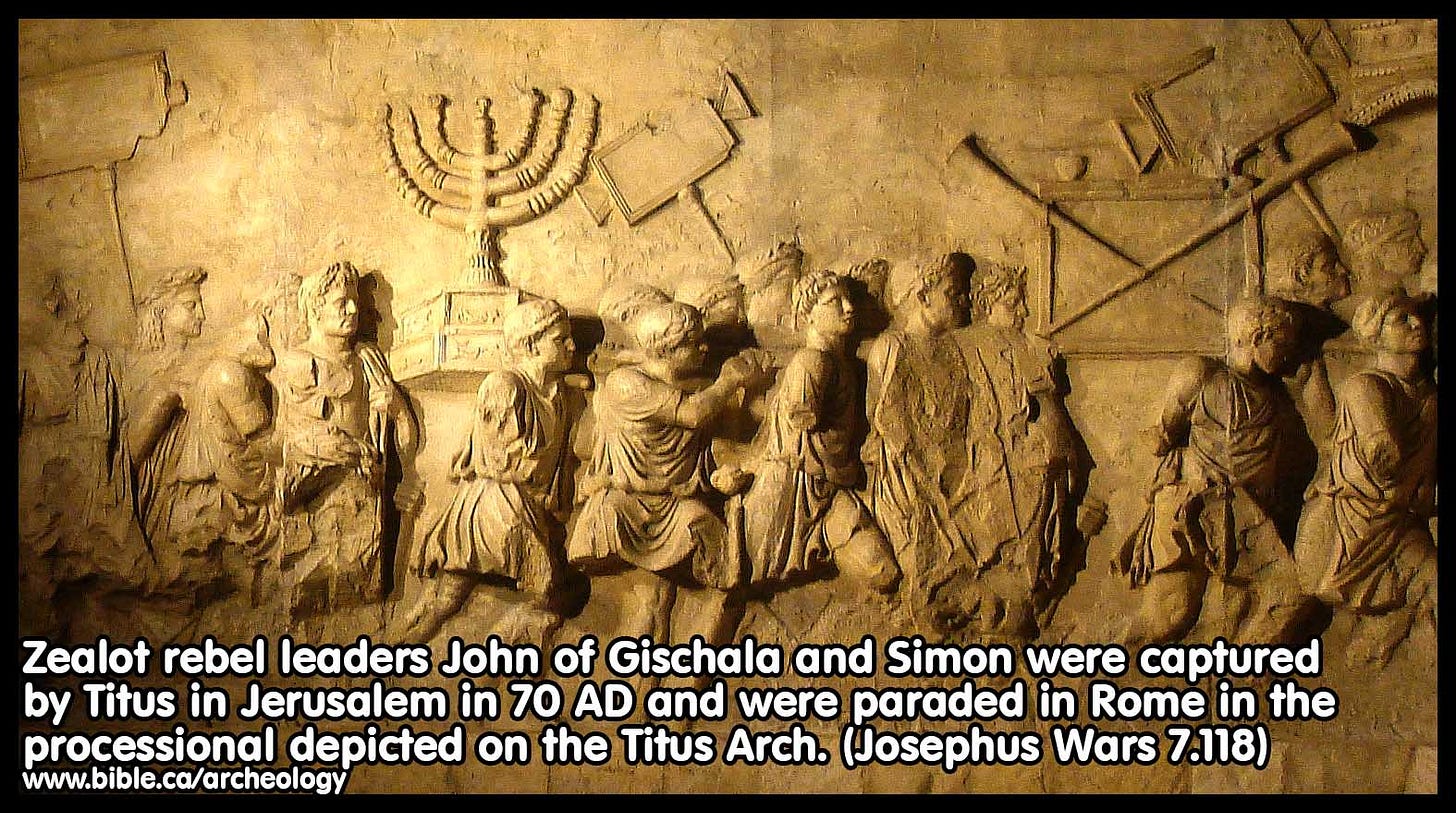One of several central passages used to defend the (quasi)Calvinistic doctrine of the Final Perseverance of the Saints is Matt. 24:13. It’s easy to see why this verse is so commonly cited, since in it, Jesus says very plainly, “But he who endures to the end will be saved” (WEB). Non-Calvinists don’t get any help from other translations, as all of them have only very minor variation on this wording.1 It’s important when we look at verses like this that we don’t try to explain them away. We need to ask seriously what Jesus is saying, and in what sense we have to endure to the end to be saved!
Saved from what?
So let me not bury the lead. Yes, we have to endure to the end to be saved. No, we do not have to endure to be saved from hell. Jesus said the former, not the latter. The assumption people tend to make is that “salvation” is always (or even usually!) from hell. But that is just not the case. I plan on doing an analysis of every use of the word(s) for “save/salvation” in a future study, but for now, let’s just look at the word itself and ask what it means in this specific passage.
The Meaning of “Save”
The Greek word here is sozo (σῴζω). We saw this word before when we looked at Jas. 2:14, so hopefully it won’t surprise you to learn that “save” doesn’t always mean “save from hell.” An important Greek lexicon called A Greek-English Lexicon of the New Testament Based on Semantic Domains by Louw and Nida defines it as, “to rescue from danger and to restore to a former state of safety and well being - ‘to deliver, to rescue, to make safe, deliverance’.” To illustrate this meaning, Louw and Nida refer us to Matt.14:30, where Peter is drowning and calls out to Jesus, “Lord, save me!”2
No one thinks that Peter was asking Jesus to take him to heaven at that moment, so at a bare minimum, we should careful when we see the word “save” and not just assume that salvation from hell is in view.
“Save” in Matthew 24
But just noting that “save” has a range of meanings doesn’t mean that Jesus doesn’t have salvation from hell in view in Matt. 24:13. After all, if we have to endure to the end of our lives to be saved, what else could be in view other than hell?
The place to start is to read the entire chapter carefully. If we do, we note that “save” occurs just nine verses later. In Matt. 24:22, Jesus says, “Unless those days had been shortened, no flesh would have been saved” (WEB). Let’s accept for the sake of argument that salvation in this chapter means salvation from hell. But then, Jesus would be saying that if the tribulation weren’t cut short, that no one would . . . make it to heaven? That doesn’t make any sense. The natural reading of verse 22 is that God has to shorten the tribulation because, if He doesn’t, then no one would survive. That, as we’ve seen, is a perfectly appropriate use of the word “save.”
So now we have three possibilities. First, Jesus uses the word “save” differently in verses 13 and 22; second, He is referring to salvation from hell in both; or lastly, He’s referring to salvation from some physical danger in both. I personally am very skeptical of the first approach, and I don’t think we should adopt it except as a last resort. And I think I just showed that the second view is untenable. I want to argue that the third view — that both passages are about salvation from a physical danger — make the most sense of the chapter.
Listening to Jesus’s Prophecy
Context matters, of course. This entire section begins with Jesus’s statement, “You see all of these things, don’t you? Most certainly I tell you, there will not be left here one stone on another, that will not be thrown down” (Matt. 24:2, WEB). Everything that follows is about the sign of Jesus’s coming at the end, which is related (contextually!) to the destruction of the Temple.
In verses four through eight, Jesus sets the stage by talking about false prophets, wars, famines, and death.3 Next, He warns His disciples that they will face martyrdom (v.9), scandal (v.10), false prophets (v.11), and rising apathy and lawlessness (v.12). If they endure these things unto the end, then they will be saved. Given the overall context, I don’t think “the end” refers to the end of their lives. Instead, “the end” refers to the destruction of the Temple and the Second Coming of Christ (cf. vv. 3, 6).
By the way, I think this rules out one possible free grace explanation — that if believers of that time are faithful then they will survive martyrdom. Jesus literally just said that they must endure being killed!
It is just here that the Calvinist reading seems the most plausible. Jesus seems to be saying that if believers endure these temptations to fall away, and if they stay faithful until He comes back, then they will be saved. And at that point, what is there left to be saved from if not eternal condemnation (cf. the Judgment of Sheep and Goats in chapter 25)? I think there’s a better reading, but let me quickly note two problems with this interpretation. First, even if it’s true, it’s only true for those believers going through the final seven years of tribulation before Jesus returns. It is unwise, at best, to take something from the Tribulation and apply it without qualification to the rest of the Church Age. Second, many Calvinists are okay with that first problem because they just deny the whole “seven years of tribulation” thing, anyway. So to adopt their view, they assume that Matthew 24 applies to all Christians at all times. For my part, I just think that’s obviously out of context and that it doesn’t take Jesus’s own framing of the passage seriously enough.
Rather than stop at verse 13, I think we should just keep reading. Jesus has been very clear. If believers in those days endure those temptations, they’ll be saved. Verse 15 is important. Jesus says, “When, therefore, you see the abomination of desolation, which was spoken of through Daniel the prophet, standing in the holy place” (WEB), and then Matthew adds a parenthetical “(let the reader understand).” Jesus (and Matthew) expects the hearers and readers to get His reference. He’s talking about Daniel 9:24-27, which describes the final destruction of Jerusalem and the establishment of the reign of God. The relevant portion says,
The people of the prince who come will destroy the city and the sanctuary. Its end will be with a flood, and war will be even to the end. Desolations are determined. He will make a firm covenant with many for one week. In the middle of the week he will cause the sacrifice and the offering to cease. On the wing of abominations will come one who makes desolate. (WEB)
This passage describes the coming, final Antichrist. He will “destroy the city [Jerusalem] and the sanctuary [the Temple]” (cf. Matt. 24:2). In the middle of this “week” or seven year period, the Antichrist will “cause the sacrifice and the offering to cease”, and we see the abomination of desolation. I take this to mean that about three and a half years into the Tribulation, the Antichrist will stop the Jewish people from sacrificing in their Temple and, in that very Temple, declare himself to be God. When that happens, believing Jews are to flee to the mountains for safety and wait for God to deliver them.4
And that’s precisely what Jesus goes on to describe in Matt. 24:16-21, including a description of that time as a “great suffering, such as has not been from the beginning of the world until now, no, nor ever will be” (v. 21, WEB).
Now we should be able to see the meaning of Matt. 24:13 clearly. This isn’t about salvation from hell or deliverance at the Judgment of Sheep and Goats. Put yourself in the shoes of believer (especially in Jerusalem) in those days. You’ve seen the false prophets and wars and martyrdom. You have every reason to let go of your faith, but you hold on in the face of that. Then you see the Antichrist fully reveal himself. Daniel 9 and Matthew 24 are unfolding before your very eyes. What do you do?
If you believe Jesus, you know what’s coming. You run. You run for the not so proverbial hills. You escape to safety. And then you watch from a safe distance as the Antichrist destroys the city and its sanctuary. You watch in dread and horror as God’s wrath is poured out for a final time on unbelieving Israel as He prepares them to call out to Him for salvation for a final time. You endured, and so you had the eyes to see what was happening. You were saved.
And your friends who gave up on their faith? Or those who never believed? They died in the destruction of the city as God poured out His wrath.
If this sounds fanciful, then note that I’m just trying to follow the text as we have it. Also, notice that something very much like this has already happened. In 70 A.D., the Roman emperor Titus destroyed the Second Temple following a Jewish revolt. The details of that destruction are so strikingly similar to Matthew 24 that many people believe that 70 A.D. was the fulfillment of Jesus’s prophecy! But we can’t accept that view, since Jesus did not return at that time. That means that we await a final, true, and ultimate fulfillment..
So, do we have to persevere until the end of our lives in faith and good works to go to heaven? I don’t think so, but even if we do, we can’t say so on the basis of Matt. 24:13. Jesus is warning believers who will be alive at the time of the Tribulation to keep their spiritual eyes peeled, so to speak, so that they see the danger as it is coming and can be saved from it. And while you and I may not be living in those days right now, that’s still a lesson we can learn from today. Sin and culture can still lead us to destruction, so let’s endure so that we can be saved when God pours out His justice in our own times.
This unanimity across translation is just because (and a clear indication that) the Greek is very straightforward. ὁ δὲ ὑπομείνας εἰς τέλος οὗτος σωθήσεται. ὁ ὑπομείνας (ho hupomeinas) is a substantival participle for “the one who endures.” (Footnote for the footnote: a substantival participle is a construction that turns a verb into a noun, so “the one who endures” functions as the subject of the sentence). The verb ὑπομένω (hupomeno) on which this is based is used 17 times in the GNT and almost always means something like “to endure.” εἰς τέλος (eis telos) just means “until the end,” and while τέλος (telos) can have various philosophical interpretations, in this context, “end” is the clear and intended meaning. οὗτος (houtos) is the most interesting word. It’s a demonstrative pronoun not strictly necessary for the sentence. In fact, it’s usually untranslated. But here it shows emphasis: “the one who endures to the end, the same will be saved.” And the verb σωθήσεται (sothesetai) is just a future passive form of σῴζω (sozo), which just means “to be saved” or “to be delivered.” The context tells us what we’re delivered from, but in terms of translation, “saved” is perfectly appropriate.
Louw and Nida is particularly helpful because, not only does it give you a gloss as with any other lexicon, but it organizes words by possible meanings. So this definition of σῴζω (sozo) is found in a group of words that variously mean, “To Cause To Be Safe, Free from Danger.” We find a second entry later in a section labeled “Save in a Religious Sense” that defines σῴζω (sozo) later in as, “to cause someone to experience divine salvation.” We even find σῴζω (sozo) in a third section with sense of providing physical healing or wholeness! The point, then, is that σῴζω (sozo) has a range of meanings, and that context determines how the word is being used.
Readers interested in prophecy should carefully compare Matt. 24:4-8 with Rev. 6.
Readers should know that this reading is in harmony with a dispensational understanding of the text. At some point, I’ll write more about that view of the Bible, but I want to suggest here that my own belief in dispensationalism is not, as some might charge, driving my interpretation. My entire goal in this reading is just to take the language to mean what it says. The fact that what emerges is something like dispensationalism just speaks well of that particular view of Scripture.







Thank you for - saving - me the time to investigate this matter 😉
Excellent and very sound, Chris. Thank you.